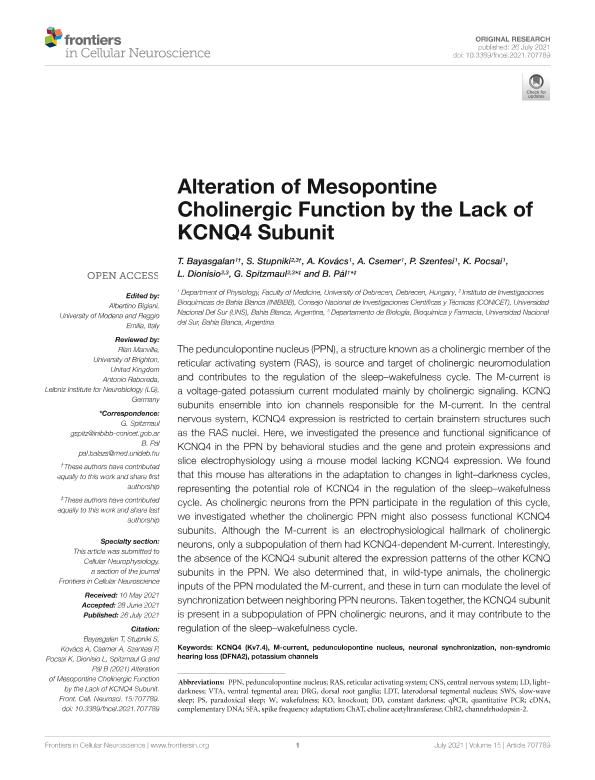Mostrar el registro sencillo del ítem
dc.contributor.author
Bayasgalan, T.
dc.contributor.author
Stupniki, Sofia

dc.contributor.author
Kovács, A.
dc.contributor.author
Csemer, A.
dc.contributor.author
Szentesi, P.
dc.contributor.author
Pocsai, K.
dc.contributor.author
Dionisio, Leonardo Raul

dc.contributor.author
Spitzmaul, Guillermo Federico

dc.contributor.author
Pal, B.
dc.date.available
2022-02-09T15:05:23Z
dc.date.issued
2021-07-26
dc.identifier.citation
Bayasgalan, T.; Stupniki, Sofia; Kovács, A.; Csemer, A.; Szentesi, P.; et al.; Alteration of mesopontine cholinergic function by the lack of KCNQ4 subunit; Frontiers Media S.A.; Frontiers in Cellular Neuroscience; 15; 707789; 26-7-2021; 1-16
dc.identifier.uri
http://hdl.handle.net/11336/151662
dc.description.abstract
The pedunculopontine nucleus (PPN), a structure known as a cholinergic member of the reticular activating system (RAS), is source and target of cholinergic neuromodulation and contributes to the regulation of the sleep-wakefulness cycle. The M-current is a voltage-gated potassium current modulated mainly by cholinergic signaling. KCNQ subunits ensemble into ion channels responsible for the M-current. In the central nervous system, KCNQ4 expression is restricted to certain brainstem structures such as the RAS nuclei. Here, we investigated the presence and functional significance of KCNQ4 in the PPN by behavioral studies and the gene and protein expressions and slice electrophysiology using a mouse model lacking KCNQ4 expression. We found that this mouse has alterations in the adaptation to changes in light-darkness cycles, representing the potential role of KCNQ4 in the regulation of the sleep-wakefulness cycle. As cholinergic neurons from the PPN participate in the regulation of this cycle, we investigated whether the cholinergic PPN might also possess functional KCNQ4 subunits. Although the M-current is an electrophysiological hallmark of cholinergic neurons, only a subpopulation of them had KCNQ4-dependent M-current. Interestingly, the absence of the KCNQ4 subunit altered the expression patterns of the other KCNQ subunits in the PPN. We also determined that, in wild-type animals, the cholinergic inputs of the PPN modulated the M-current, and these in turn can modulate the level of synchronization between neighboring PPN neurons. Taken together, the KCNQ4 subunit is present in a subpopulation of PPN cholinergic neurons, and it may contribute to the regulation of the sleep-wakefulness cycle.
dc.format
application/pdf
dc.language.iso
eng
dc.publisher
Frontiers Media S.A.
dc.rights
info:eu-repo/semantics/openAccess
dc.rights.uri
https://creativecommons.org/licenses/by/2.5/ar/
dc.subject
KCNQ4 (KV7.4)
dc.subject
M-CURRENT
dc.subject
NEURONAL SYNCHRONIZATION
dc.subject
NON-SYNDROMIC HEARING LOSS (DFNA2)
dc.subject
PEDUNCULOPONTINE NUCLEUS
dc.subject
POTASSIUM CHANNELS
dc.subject.classification
Bioquímica y Biología Molecular

dc.subject.classification
Ciencias Biológicas

dc.subject.classification
CIENCIAS NATURALES Y EXACTAS

dc.title
Alteration of mesopontine cholinergic function by the lack of KCNQ4 subunit
dc.type
info:eu-repo/semantics/article
dc.type
info:ar-repo/semantics/artículo
dc.type
info:eu-repo/semantics/publishedVersion
dc.date.updated
2021-08-13T16:19:07Z
dc.identifier.eissn
1662-5102
dc.journal.volume
15
dc.journal.number
707789
dc.journal.pagination
1-16
dc.journal.pais
Suiza

dc.journal.ciudad
Lausanne
dc.description.fil
Fil: Bayasgalan, T.. University of Debrecen; Hungría
dc.description.fil
Fil: Stupniki, Sofia. Consejo Nacional de Investigaciones Científicas y Técnicas. Centro Científico Tecnológico Conicet - Bahía Blanca. Instituto de Investigaciones Bioquímicas de Bahía Blanca. Universidad Nacional del Sur. Instituto de Investigaciones Bioquímicas de Bahía Blanca; Argentina. Universidad Nacional del Sur. Departamento de Biología, Bioquímica y Farmacia; Argentina
dc.description.fil
Fil: Kovács, A.. University of Debrecen; Hungría
dc.description.fil
Fil: Csemer, A.. University of Debrecen; Hungría
dc.description.fil
Fil: Szentesi, P.. University of Debrecen; Hungría
dc.description.fil
Fil: Pocsai, K.. University of Debrecen; Hungría
dc.description.fil
Fil: Dionisio, Leonardo Raul. Consejo Nacional de Investigaciones Científicas y Técnicas. Centro Científico Tecnológico Conicet - Bahía Blanca. Instituto de Investigaciones Bioquímicas de Bahía Blanca. Universidad Nacional del Sur. Instituto de Investigaciones Bioquímicas de Bahía Blanca; Argentina. Universidad Nacional del Sur. Departamento de Biología, Bioquímica y Farmacia; Argentina
dc.description.fil
Fil: Spitzmaul, Guillermo Federico. Consejo Nacional de Investigaciones Científicas y Técnicas. Centro Científico Tecnológico Conicet - Bahía Blanca. Instituto de Investigaciones Bioquímicas de Bahía Blanca. Universidad Nacional del Sur. Instituto de Investigaciones Bioquímicas de Bahía Blanca; Argentina. Universidad Nacional del Sur. Departamento de Biología, Bioquímica y Farmacia; Argentina
dc.description.fil
Fil: Pal, B.. University of Debrecen; Hungría
dc.journal.title
Frontiers in Cellular Neuroscience
dc.relation.alternativeid
info:eu-repo/semantics/altIdentifier/url/https://www.frontiersin.org/articles/10.3389/fncel.2021.707789/full
dc.relation.alternativeid
info:eu-repo/semantics/altIdentifier/doi/http://dx.doi.org/10.3389/fncel.2021.707789
Archivos asociados
